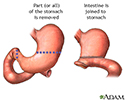Anastomosis
An anastomosis is a surgical connection between two structures. It usually means a connection that is created between tubular structures, such as blood vessels or loops of intestine.
For example, when part of an intestine is surgically removed, the two remaining ends are sewn or stapled together (anastomosed). The procedure is known as an intestinal anastomosis.
Examples of surgical anastomoses are:
- Arteriovenous fistula (an opening created between an artery and vein) for dialysis
- Colostomy (an opening created between the bowel and the skin of the abdominal wall)
- Intestinal, in which two ends of intestine are sewn together
- A connection between a graft and a blood vessel to create a bypass
References
Galandiuk S, Netz U, Morpurgo E, Tosato SM, Abu-Freha N, Ellis CT. Colon and rectum. In: Townsend CM Jr, Beauchamp RD, Evers BM, Mattox KL, eds. Sabiston Textbook of Surgery. 21st ed. St Louis, MO: Elsevier; 2022:chap 52.
Gastrectomy - illustration
Gastrectomy
illustration
Before and after small intestine anastomosis - illustration
Before and after small intestine anastomosis
illustration
Review Date: 5/29/2024
Reviewed By: Debra G. Wechter, MD, FACS, General Surgery Practice Specializing in Breast Cancer, Virginia Mason Medical Center, Seattle, WA. Also reviewed by David C. Dugdale, MD, Medical Director, Brenda Conaway, Editorial Director, and the A.D.A.M. Editorial team.





